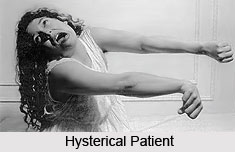 Hysteria is a neurosis, which manifests itself by over action of some parts of the nervous system. In its colloquial use, hysteria describes a state of mind that is one of unmanageable fear or emotional excesses. The fear is often centred on a body part, most often on an imagined problem with that body part.
Hysteria is a neurosis, which manifests itself by over action of some parts of the nervous system. In its colloquial use, hysteria describes a state of mind that is one of unmanageable fear or emotional excesses. The fear is often centred on a body part, most often on an imagined problem with that body part.
People who are `hysterical` often lose self-control due to the overcoming fear. Psychiatrists and other physicians have given up the use of `hysteria` theoretically. They replaced it with more euphemistic terms that are essentially synonyms. These include psychosomatic, functional, nonorganic, psychogenic, and medically unexplained.
The symptoms of hysteria are convulsive seizures, spasms and contractions of the limbs, paralysis, loss of sensation over areas of the body, and affliction of the various internal organs. Most of these symptoms are the result of autosuggestion and are readily relieved by suggestion from another person.
According to Ayurveda, hysteria is regarded as another form of epilepsy. The condition is far more common among women than in men. Faulty upbringing during childhood predisposes a person to hysteria. Young women with somewhat unequally developed minds and pampered habits can become hysterical due to sudden fright, family worries, grief, or a love affair. Mental changes occur among victims of hysteria. They become whimsical, are dominated by certain fixed ideas, and prove incapable of the same work and concentration as before. They also become more excitable and hypersensitive.
Convulsive hysteria is the most marked form of hysteria. An attack provoked by some excitement may begin with laughter or weeping, or may give no warning sign. The victim falls into a semi-conscious or unconscious condition. The difference between an epileptic fit and a hysterical fit is that the victim of epilepsy falls down suddenly. He or she can injure himself, whereas a hysterical patient gently subsides into a chair or on to the floor. She moans, moves her head from side to side, and rolls her eyes. During this stage, she may see visions and exhibit powerful emotions of fear, ecstasy, or joy. Loss of sensation in some parts of the body is often noticed. In some cases, it may even resemble paralysis. The other manifestations are spasms and contractions of the muscles, leading to some deformity if the muscles are too tightly pulled during a fit.
The paralysis accompanying hysteria is generally of a psychological origin, passing off if the attention is strongly diverted or somebody is able to mentally affect the patient. In some cases, the muscles of the larynx become paralyzed. In the worst case, the victim may go about like a mute person for years before some powerful influence forces her to exert her will and make her talk.
Hysteria affects only those people who have a weak will power and are given to fantasies of suffering. In some cases, there may be some changes that take place in the internal organs of the body. Constant hiccups, barking noises, excessive vomiting, diarrhoea, absolute loss of appetite, and profound changes in blood circulation may take place. A joint, especially of the hip or the knee, may become swollen, stiff, and painful and may remain so for months.
Hysterical patients should be tactfully but firmly handled. They should not be allowed to seat ideally while away in useless pursuits. Enough work should be provided to them to occupy their time. Most important of all, they should not be pampered. They should be exhorted to strengthen their power of resistance and told that there is nothing wrong with them. Techniques of suggestion should be applied to bring them to full recovery. Persuasion, psychoanalysis, education, and employment are important in the treatment of hysteria. They should be tactfully handled. Even slight ignorance can make the situation worst.
Medicines and Prescriptions: Hysteria can be treated by following the same regimen of medication as has been indicated for epilepsy.
Diet and Other Regimen: The patient can continue to take a normal diet.




















